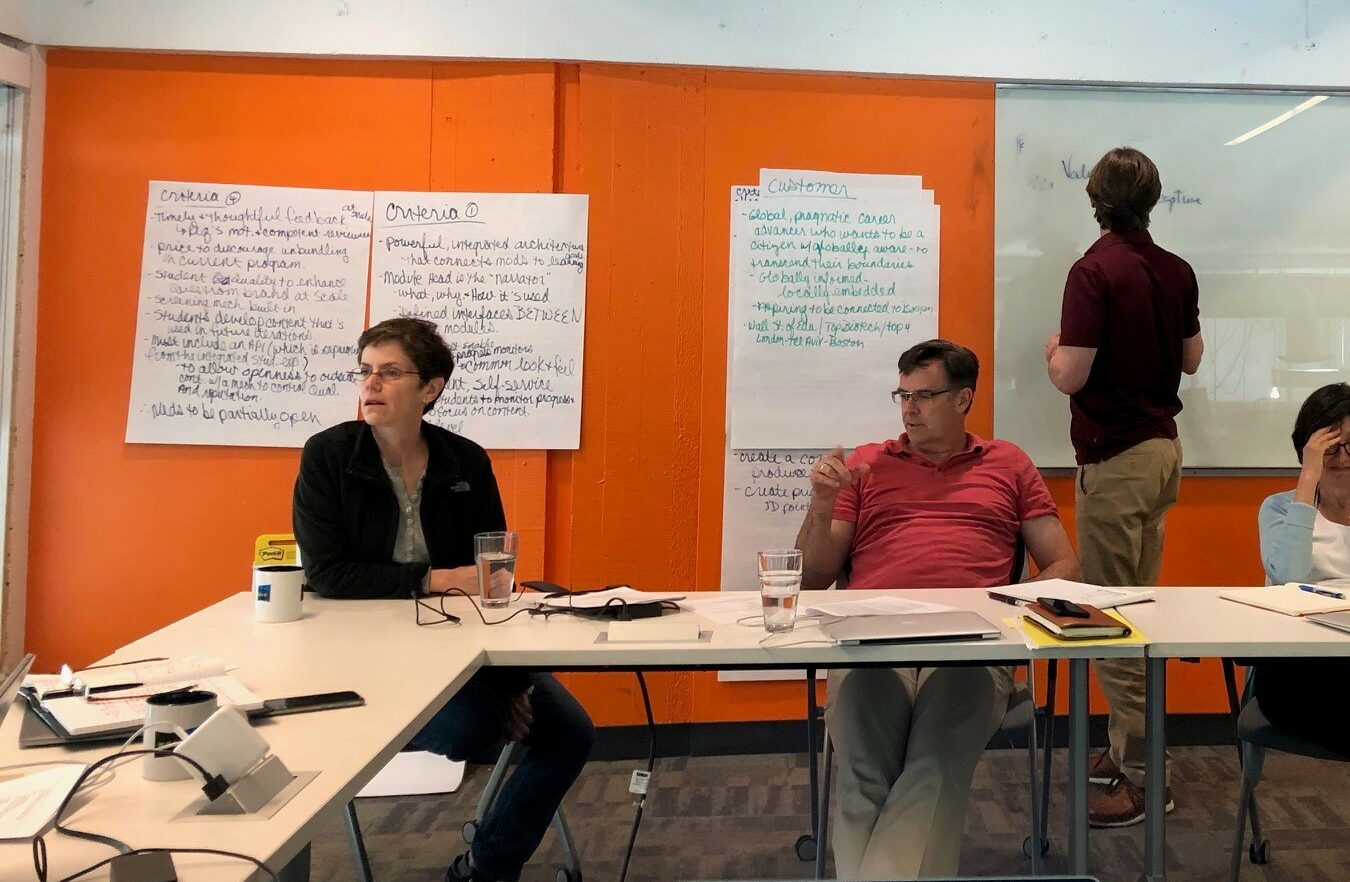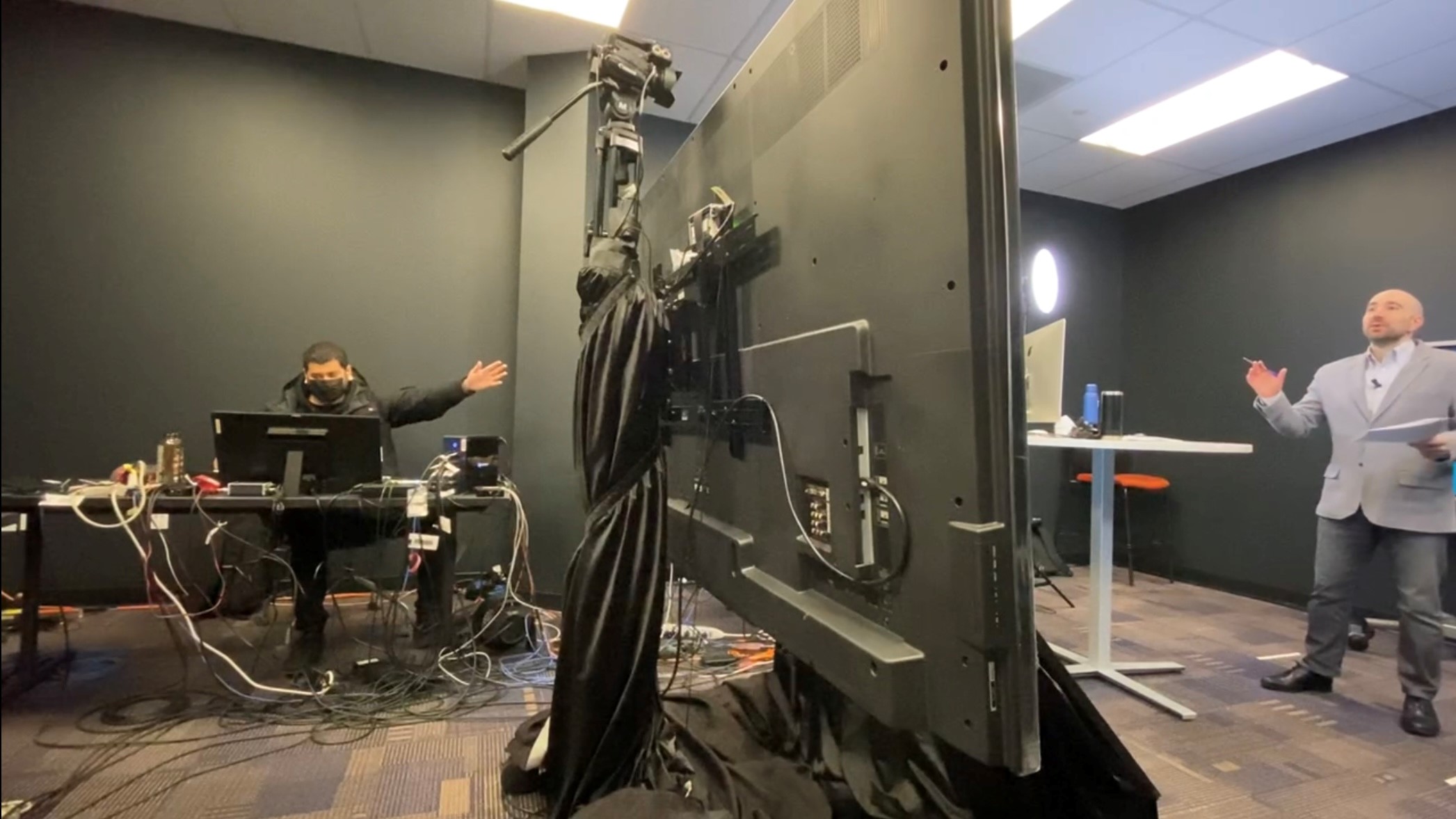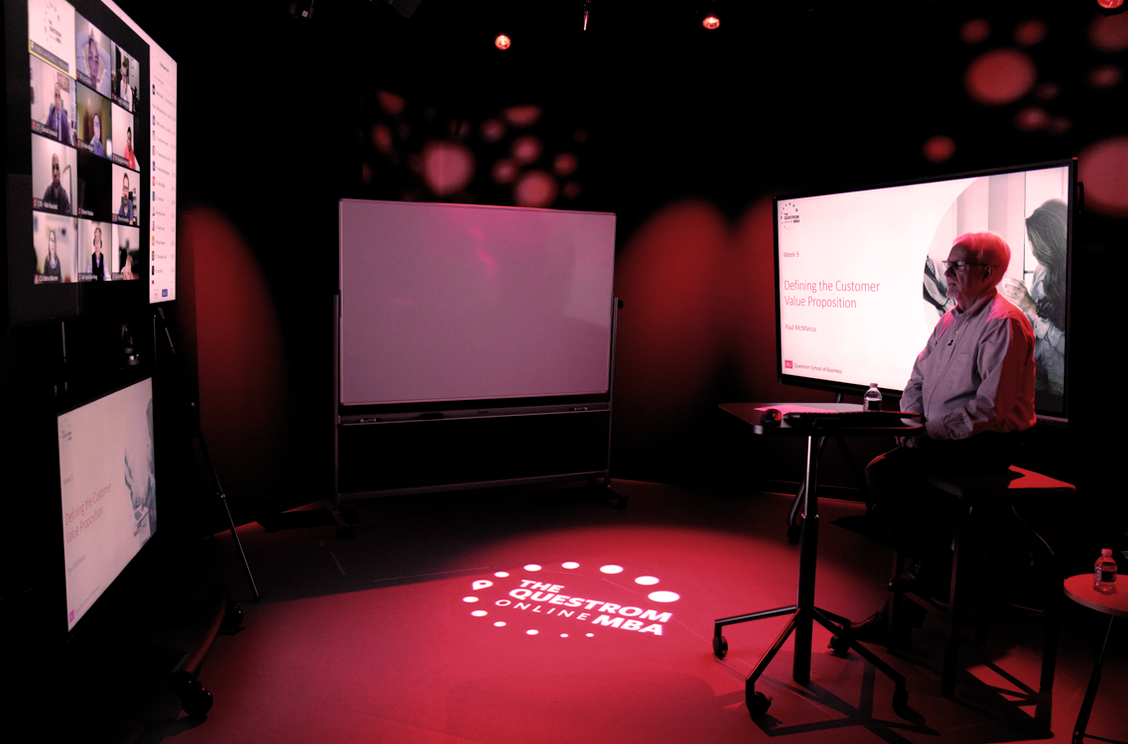ABOUT OMBA
Completed in as little as two years, this high-quality, rigorous, and engaging MBA is 100% online. Developed and delivered by the same world-class faculty who teach in our top-ranked, on-campus MBA programs, the Online MBA will allow you to advance critical capabilities required to make management decisions in the complex global business ecosystem.
The Online MBA is designed from the ground up with the global online-learner in mind and rooted in insights gained from over 3,000 international industry professionals, the BU Questrom Online MBA offers an innovative curriculum that focuses on the themes that drive business in the 21st century. The program’s rigorous, integrated curriculum requires a high level of student engagement. Students admitted to the Online Master of Business Administration (OMBA) complete the entirety of the program online through a series of six 7.5 credit modules in addition to a noncredit, pass/fail orientation module (Module 0). Upon completion of the six modules for a total of 45 credits, students are awarded the Master of Business Administration with a major in general management.
All Online MBA students have access to a student success specialist, the BU online job board, as well as other university resources such as the BU Library – both online and on-campus. And, at the end of your program, join us in Boston to receive your degree and attend the Boston University and Questrom commencement ceremonies.
As an Online MBA student, you’ll be part of a learning community that’s truly global—including outstanding faculty and staff here in Boston and an international network of over 51,000 talented Questrom alumni and 400,000 Boston University alumni— not to mention your fellow Online MBA students located all around the world.
No matter what field you’re in, a Questrom degree will put you ahead of the curve and position you for future success. With the Online MBA, you won’t have to put anything in your life on hold.
Our
Program
The BU Questrom Online MBA requires 45 credit hours of coursework comprised of six 7.5-credit semester-long integrated modules. The curriculum is designed so that you take one module a semester and each module builds on the one before it. No more worrying about what courses to take and when.
Module 0 is a required, non-credit (pass/fail) introduction to the resources and overarching learning principles of the Online MBA. Students will be exposed to the underlying technology utilized to deliver the experience as well as learn communication techniques for managers as well as teaming process in the business.
- Introduction to the Online MBA learning platforms
- Orientation to BU and Questrom School of Business
- How to be successful in an online learning environment
Module 1 focuses on the purpose of the corporation and the role of the manager in creating and capturing value for their business. In this module, we introduce you to foundational concepts in micro-economics as well as the emerging ideas of information economics that dominate digital business models. This will help you recognize that today’s business world is a nexus of traditional physical products and digital services and platforms. You will apply these core foundational ideas in a capstone project focused on the automotive industry, where physical products and digital services are coming together in new ways for a business to create and capture value.
- Role of business in society
- Global business trends shaping the role of the manager
- Economic principles of how corporations create and capture
- Impact of information and digital transformation
Module 2 emphasizes the use of data in decision making, performance measurement, and system evaluation. Introductory financial accounting, managerial accounting, corporate finance, microeconomics, statistics and operations will be highlighted. Because of the advances in data collection, we now have more access than ever to nearly every type of data imaginable. Module 2 will teach students how to better understand and analyze both financial and non-financial data and use the information in improved decision making. In Module 2 we will follow the story of Questrom Bakeries, a fictional company that competes in the ready-to-eat cookie market. We will use the ongoing Questrom Bakeries case to apply and assemble the concepts and measurements being introduced each week. After module 2, managers will be able to make better use of data in framing important decisions and approaching them quantitatively.
- Find data for your business or organization
- Build a dashboard to monitor any business or organization
- Analyze financial statements and accounting metrics
- Use statistics and data to drive business decisions
- Understand basic ideas in operations like process analysis and improving quality
The focus of Module 3 is to equip you with ways of thinking about and behaving effectively in situations that call for formal or informal leadership. Module 3 challenges you to step into a leadership role, regardless of the formal position you hold in an organization. Leadership requires us to demonstrate behaviors such as empathy, establishing trusting relationships, and bringing out the best in others. It also requires us to refine and strengthen skills such as leading new initiatives, managing a global team, and rebuilding an organizational culture. In Module 3 we pay particular attention to the processes by which leaders proactively engage others in pursuit of organizational and societal goals. You will gain the tools, skills, and frameworks you need to accurately diagnose a situation, develop a deep understanding of the forces at play and take effective action based on your own personal values, the needs of your organization, and the needs of society.
- Clarify and enact individual purposes, intentions, and values
- Build interpersonal leader-follower relationships
- Develop, change, and maintain thriving organizations
- Position organizations as ethical actors within society
The Covid pandemic reminded us what an uncertain world we live in. The crisis has impacted every organization. But dealing with risk is not just about dealing with crises. In fact, it is an issue that needs constant attention. Failure to do so can destroy value and even threaten the very survival of an enterprise. Managed well, it can be a valuable source of competitive advantage. Module 4 introduces you to the diverse set of tools managers need to measure, manage, and monitor different types of risks appropriate to all managers. Risks can arise from various sources. Some external to the company like interest rates or demand fluctuations, or systemic forces like climate change. Others internal – like technology innovations, model error, brand crisis or cyberattacks. Managers from different departments may perceive risks differently, or deal with different risks, but they all must manage risk. In Module 4 we will bring multiple functional perspectives and expertise together to view risk from all angles of the business and will introduce a framework to integrate the different perspectives in a holistic way.
- Assess environmental, social, political, and regulatory risk
- Financial risk management
- Develop processes for measuring and monitoring risk
- Manage operational risk
In Module 5, we will continue and, in many ways, will culminate one of the program’s theme of being, “The MBA for a Connected World.” We will explore the challenges and opportunities associated with conducting business globally with different regions and environments. Specifically, we will examine the tools of Marketing in order to ensure that firms know what the best mix of products and services is to meet current and future customer interests. We will explore a firm’s global supply chains and introduce tools of Operations that help us optimize such chains to meet customer demands. We will also explore the tools of Strategy that help us analyze the external environments in which firms compete to develop a firm’s capabilities so that it matches its strategy with external demands.
- Understand the challenges of a global business
- Manage the marketing mix for various customer segments
- Source and optimize supply chains globally
- Develop competitive strategies in a global context
Module 6 explores how you can create not just an innovative mindset but also offers a toolkit that can help accelerate innovation outcomes at the individual, team, and organization level. What is an innovation mindset? It is a constant search for new ways to deliver value that meet a true need, coupled with the ability to mobilize the resources to experiment and put those ideas into practice. It is after all, mindsets, not devices, that are the driving source behind new innovations. Mindsets are powerful because they create frames for what we experience, and they both inform and limit the way we think and act – thus they define the landscape of opportunities. But we also view toolkits as important as innovation is inherently uncertain, risky and resource intense. We have carefully curated toolkits to advance idea generation and concept development that should help you both create and claim value while balancing the need to maintain existing operations.
- Apply principles of design thinking to reframe innovation challenges
- Source and generate new ideas that create value
- Align organizational capabilities to develop and test those ideas
- Manage the innovation portfolio
Our Story
While the OMBA program is still relatively young, the story of our launch is rich.

OMBA Conceptualization Begins
After completing a robust analysis, Questrom begins to conceptualize a fully online affordable MBA in partnership with edX.

BU Announces $24K Online MBA
BU Questrom announces that they will enter the online MBA market with an affordable OMBA offering in partnership with edX. The announcement is met with acclaim in the media.

Curriculum Design Commences & Passes Faculty Vote
Over the next several months, the inaugural group of faculty are identified and begin to design the innovative curriculum of OMBA.

Program Content Developed Amidst Global Pandemic
Once the modular program passed the faculty approval process, work began to develop the content of the first several modules. While design began early in 2020, the bulk of it occurred remotely while BU and the world grappled with Covid-19.

Production Begins and Size of First Class Doubles
During the summer of 2020, production began to film and curate all of the course materials for the first two modules. The application pool for the first cohort was so strong, the initial cohort target size was doubled to 500.

OMBA Begins with First Cohort
The historic first cohort of OMBA begins in early September. The live sessions of the first semester took place in our temporary studios.

New Live Studios Open
In March of 2021, OMBA moves into the new live studios complete with control rooms, interactive technology, and recording sound stage.

First OMBA Cohort Graduates
Over 300 of the first cohort's graduates come to Boston to participate in the Questrom Graduate Convocation Ceremony.
